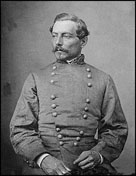Colonial Wars |
American Wars |
Link To This Page — Contact Us —
General P.G.T. Beauregard
 |
| NAME |
| Beauregard, Pierre Gustave Toutant |
| BORN |
| May 28, 1818 St. Bernard Parish, LA |
| DIED |
| February 20, 1893 New Orleans, Louisiana |
| ARMY |
| Confederate |
He was born of Creole parents, and spoke French before he spoke English. Beauregard graduated 2nd out of 45 in his class from West Point in 1838. After graduating, Beauregard was commissioned a 2d lieutenant in the Corps of Engineers and assigned to Fort Adams, near Newport, Rhode Island.
He was promoted to 1st lieutenant in 1839 and transferred to Pensacola, Florida to build coastal defenses. He was then transferred to Batavia Bay on the Louisiana Gulf. During the Mexican War, he worked as an engineer under Gen. Winfield Scott. Beauregard received 2 wounds and 2 brevets during the course of the war.
For several years, he supervised the building of coastal fortifications. Chief engineer in charge of draining New Orleans from 1858 to 1861, he also directed the federal customs house in that city. In January of 1861, he was Beauregard was briefly appointed superintendent of West Point. He held the position for only a few days, however, before his outspoken Southern sympathies led to his being released.
On February 20, 1861, Beauregard resigned his commission, and accepted a commission as the first Brigadier General in the Confederate Army on March 1. He commanded the battle at Fort Sumter. This was the Confederacy's first victory, and it established Beauregard's reputation. Upon his return to Richmond, Virginia, Beauregard was ordered to direct Confederate troops during the battle of 1st Bull Run. Promoted to the rank of full-general on August 31, 1861.
In order to remove Beauregard from the Richmond area, President Jefferson Davis moved him to the West. When Gen. Albert S. Johnston was killed at Shiloh, Beauregard took over the overall command and the command of the Army of Tennessee. He sent word to Richmond that the battle was a Confederate victory, but the troops were not able to defeat the Union troops.
Davis blamed Beauregard for failing to achieve a victory. He became ill in 1862 and gave command to Gen. Braxton Bragg temporarily, Davis made the transfer of power permanent by claiming that Beauregard left his post without authority. Upon his recovery, Beauregard was appointed to the command of the coastal defenses and commander of the Military District of South Carolina, Georgia, and Florida from 1862-1864. He also directed the defense of Charleston, South carolina from 1863-1864.
In April of 1864, he was recalled to Virginia, and began assisting Gen. Robert E. Lee by defending the southern entry to Richmond. Considered vain and egotistical by many, Beauregard was held to be a better engineer than military strategist. He was very popular because of his victory at Fort Sumter, and was quite competent as a military commander. Nevertheless, his reputation may have exceeded his abilities. He tended to make highly critical remarks about others, adopt "textbook" strategies and lose his temper.
By the last year of the war, Beauregard was appointed to the command of the Military Division of the West, a position with little prestige and no military influence. In the last weeks of the war, he co-command with Gen. Joseph E. Johnston in the Carolinas Campaign, defending North Carolina from Major Gen. William T. Sherman's forces. Beauregard surrendered his forces at Durham Station, North Carolina on April 26, 1865.
After the Civil War, Beauregard returned to New Orleans. He became President of New Orleans, Jackson and Mississippi Railway, Supervisor of Louisiana Lottery, Commissioner of Public Works-New Orleans, and the Louisiana Adjutant General. Although he received many offers to command the armies of foreign nations, he refused all of them.
Promotions:
- Brigadier General - February 20, 1861
- General - August 31, 1861
Major Commands:
- Army of Tennessee after Gen. Albert S. Johnston killed
- defense of South Carolina and Georgia
- defenses south of Richmond
- second in command to Gen. Joseph E. Johnston in Carolinas campaign
